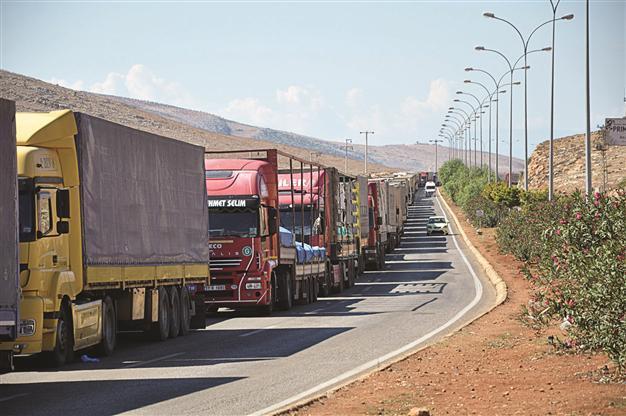Turkish truckers paid $1 billion to Iran for fuel prices difference
ISTANBUL – Anadolu Agency

DHA Photo
Turkish transporters have paid more than $1 billion to Iran for the difference in fuel prices between the two countries, said the head of the International Transporters Association (UND) Fatih Şener at a press meeting on Oct. 17.
Şener said Turkey and Iran should be working to ease high truck traffic to Iran by developing new routes between Turkey and the Turkic Republics, such as new ferry lines over the Caspian Sea.
“As Turkish transporters, we unfortunately face an unfair situation with Iran. We pay higher transit fees because fuel is more expensive in Turkey than it is in Iran and we pay this difference to Iran. Iranian trucks are more favorable than Turkish trucks, as they ask for lower transport prices from potential customers in the region," he added.
"Turkish trucks paid over $1 billion to Iran for the differences in fuel prices between the two countries in the last decade, and this amount will rise to $2.5 billion in the next decade, according to our calculations,” Şener also said.
The crisis between Turkey and Iran over truck transit fees has lately heated up amid the latest hikes in passage fees.
“Turkey and Iran signed an agreement on road transportation in 1994. Turkey violated the law by doubling the passage fee for Iranian trucks to enter the Turkish border,” Deputy Transport Minister of Iran Davood Keshaverziyan said at a press conference last week in Tehran.
Turkish representatives have been objecting to the $750 transit pass fee, which Iran applies to Turkish trucks, saying it is too high, but Iran has not made any changes. Turkey therefore increased its transit fee for Iranian trucks to $750 on Oct. 11, but Iran doubled its fee to $1,500 just a few hours later. Turkey then doubled its fee for Iranian trucks to $1,500 following Iran’s move, saying it has started to take 25 euros per 100 kilometers for fuel from Iranian trucks, as Iran does to Turkish trucks.
Sector representatives from both countries expect further hikes.
“This is definitely unfair competition. Iran carries freight for lower costs than Turkish trucks can. Iranians come to Turkey with their full gas tanks, which they have filled up $0.18 per liter, and they upload their cargo to carry. Turkish trucks have therefore lost their market share dramatically. They cannot find customers at home in Turkey or in Iran due to higher fuel costs,” Şener said.
“Both of us now have a common problem with the inefficiency of our border gates. Over 300 trucks are waiting to cross into our borders from Iran and 600-700 trucks into Iranian borders from Turkey. As Turkish authorities, we are quite aware of the need to create new alternative routes to ease high truck traffic on Iranian roads [as a transit country from Turkey to Turkic Republics]. We are working on different alternatives,” he also noted.
